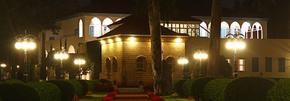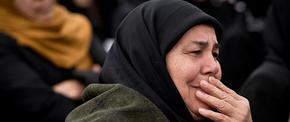The views expressed in our content reflect individual perspectives and do not represent the authoritative views of the Baha'i Faith.
The Baha’i Faith began in 1844, originating in a revolutionary departure from Islam called the Babi Faith, whose prophet said he had come to herald “Him whom God shall make manifest.”
With its roots in the mystical Sufi tradition, the Bab promulgated the newly-revealed Babi religion, which challenged the status quo in nineteenth-century Persia and served as the precursor and progenitor of the Baha’i Faith.
RELATED: The Three Primary Principles of the Baha’i Faith
From its beginnings in 1844, the Babi religion enraged and threatened the Muslim clergy and the theocratic government – because it proclaimed that religion is one, and must be renewed from one era to the next in a divine springtime, a resurrection of spirituality for all humanity. Regarding the succession of spiritual messengers and prophets throughout human history, the Bab wrote:
Were the risings of the sun to continue till the end that hath no end, yet there hath not been nor ever will be more than one sun; and were its settings to endure for evermore, still there hath not been nor ever will be more than one sun. It is this Primal Will which appeareth resplendent in every Prophet and speaketh forth in every revealed Book.
Since the physical seasons must change, the Bab taught that our spiritual lives also depend on change and growth. Eventually, winter ends and new life awakens and pushes through the dormant earth. The followers of the Bab, called Babis, believed that the time had come for a spiritual awakening – that new, progressive religious ideas must succeed outdated dogma. In a society steeped in the belief that Muhammad was the last of all prophets, and that Islam was the final and greatest of all religions, this claim was blasphemy; apostasy; a heinous crime. In Persia in the mid-1800s, there was no such thing as religious freedom, so the Babis faced hideous persecution and death – by the thousands.
During this tumultuous period, huge numbers of people became followers of the Bab. But the harsh reaction from the powerful clerical establishment and the government resulted in torture, prison, and death for approximately 20,000 Babis. Despite this genocidal pogrom, Baha’u’llah and his companions fearlessly proclaimed their Faith, and willingly went to prison for it, even though they had committed no crime.
Baha’u’llah’s wife Navvab learned of her husband’s first arrest when a servant suddenly rushed into her presence in great distress. “He is arrested! — I have seen him!” the servant cried. “He has walked many miles! O they have beaten him! … His feet are bleeding! . . . There are chains upon his neck.”
Soon, everyone knew of Baha’u’llah’s arrest. The family home was ransacked by mobs. Navvab gathered what she could and went into hiding with her children. She knew very well that Babi women and children had been murdered by mobs many times before.
For many years Navvab and her husband Baha’u’llah had worked side by side to help the destitute in Persian society – in fact, Baha’u’llah had long been known in his country as “The Father of the Poor.” Now, she and her children had instantly become homeless themselves. To purchase food for the children, she sold some gold buttons from her clothing. At times she had nothing to offer her children to eat but a bit of dry flour that she poured into the palms of their hands. Despite their own dangerous situation, the family’s greatest anxiety centered on Baha’u’llah: Was he alive? Was he being tortured?
After a few days the family learned where the authorities had imprisoned Baha’u’llah – in the infamous Siyah-Chal, the “Black Pit” of Tehran. Baha’u’llah’s oldest son Abbas, later known as Abdu’l-Baha, then eight years old, could not be held back. He loved his father intensely, and had to see him, so he persuaded an adult to take him to see his father. When the boy reached prison, the adult carried him on his shoulders down the stairs into the Black Pit, a foul and pestilential place that had once been an underground cistern. As they descended into the darkness, they could see nothing. Suddenly, they heard the voice of Baha’u’llah command, “Do not bring him!”
RELATED: Baha’u’llah’s Suffering and the Birth of a New Belief
Immediately, the adult carrying Abdu’l-Baha turned around and walked back up the stone stairs. They then learned from the guards that the prisoners would emerge briefly at noon for their meal. Abdu’l-Baha waited until noon when, filthy and ragged, guards brought the men out of the pit. Then he saw his father: bent over from the weight of the chains, his neck bruised and swollen from a heavy steel collar, clothes tattered, hair and beard disheveled, his face pale and gaunt. At some point during his imprisonment, Baha’u’llah had been poisoned and his appearance dramatically showed its effects. The eight-year-old fainted from the shock, and had to be carried away.
Abdu’l-Baha’s own words about Baha’u’llah’s captivity, from a speech he gave in New York City during his later life, describe what Baha’u’llah’s son and eventual successor began to understand on that terrible day:
Because He suffered imprisonment, we are free to proclaim the oneness of the world of humanity for which He stood so long and faithfully. He was chained in dungeons, He was without food, His companions were thieves and criminals, He was subjected to every kind of abuse and infliction, but throughout it all He never ceased to proclaim the reality of the Word of God and the oneness of humanity.
















Comments
Sign in or create an account
Continue with Googleor